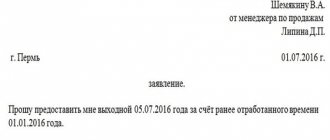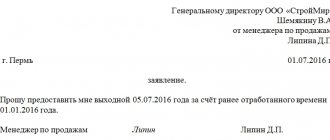The need to adhere to the vacation schedule
Citizens engaged in labor activities are entitled to rest. When these rights are exercised, the interests of the enterprise should not suffer. For this reason, each enterprise, based on the characteristics of its activities, annually draws up a special act, through which the procedure for providing rest time is regulated. When creating a schedule, it is necessary to take into account the wishes of employees.
There is a single form of the act, the T-7 form is used. At the same time, it is possible to use your own sample. A mandatory requirement is the reflection of certain details. The obligation to implement the act in question rests with both the company’s management and employees.
It is important to take into account that there is a certain group of citizens for whom labor legislation and other regulations establish guarantees for the provision of rest time, regardless of the schedule.
The vacation schedule is mandatory for employees and the employer
Employees have the right to vacation (for more information, see “Granting vacation: calendar or working year”). However, when implementing the rights of employees, the interests of the organization should also not suffer. Therefore, based on the specifics of the organization’s work, the order of employee vacations is established by a special document - a vacation schedule, which is approved by the head of the enterprise. This document is drawn up taking into account the specifics of the organization’s economic activities and the wishes of employees.
In practice, enterprises use form No. T-7, but it is not forbidden to use a self-developed form. The main thing is that it contains all the required details (for more details, see “Primary document: indicate the required details”). The vacation schedule is mandatory for execution by both employees and the employer (Article 123 of the Labor Code of the Russian Federation). However, there are employees who are guaranteed unscheduled leave by the Labor Code and other regulations.
Persons to whom the schedule does not apply
Some employees have the right to use vacation at a time convenient for themselves. When deciding whether a vacation is necessary, a person does not need to take into account the opinion of the company’s management on this matter. This category includes:
- persons under the age of majority;
- citizens who use vacation for the first year of work in the company;
- those who have the title of honorary donor of the country;
- persons raising children with disabled status (in this case, the child should not be older than 18 years);
- female representatives who have more than 1 child under the age of 12 years;
- citizens who are raising two children under the age of 12, but they do not have a mother;
- persons participating in the Second World War, disabled people;
- combat veterans;
- citizens who suffered during the Chernobyl tragedy;
- persons holding the title of Hero of the USSR or the Russian Federation, holders of the Order of Glory.
The length of leave depends on which category the person is classified into.
Rest outside the schedule according to law
There are categories of citizens who can choose a time of rest at a time convenient for them. The employer has no right not to allow such employees to go on vacation. The list of them is quite large, but most often the following benefits are used at the enterprise:
- minor workers;
- women, before the start of maternity leave, or immediately after its end;
- men during the period when the wife is on maternity leave;
- employees previously recalled from regular vacation.
Family leave
In this case, the employer can pay for rest time or provide its employee with financial support. This happens when a person dies or is born in an employee’s family. Payment is also provided if a parent or child gets sick. However, this type of leave is often provided without pay. This indicates that payment is not due to the citizen. The process of registering such rest time is regulated by the provisions of norm 128 of the Labor Code of the Russian Federation.
It is provided that a citizen is not present at his workplace for a certain period, and his earnings are not retained. The length of rest time depends on the situation in a person’s life. It is necessary to coordinate the provision of rest days with the management of the enterprise. In practice, there are situations when the director refuses a request for leave. This happens if management considers the reasons unjustified.
The law indicates that such leave is a right, but not an obligation, of the company. Exceptions include situations where rest is requested by a person who is directly referred to in the law. These categories are listed above. It is established that it is not necessary to disclose the reason for going on vacation, however, indicating it will increase the chances of a positive response from management.
Wedding motives
Now let's look at a happier reason for taking a vacation. We're talking about marriage. To be fair, we note that in most cases, future newlyweds plan their wedding days in advance and are unlikely to suddenly need a vacation. However, in connection with marriage, the employer must also provide the employee, at his request, with leave for a period of no more than five calendar days. This is one of those cases when a company cannot refuse an employee, the basis is Article 128 of the Labor Code of the Russian Federation.
Moreover, days off will need to be provided regardless of at what point the employee submitted the application for vacation - even a week before it starts, even three days, even a day. And no matter how long the employee works in the organization. Ideally, wedding leave should be agreed upon with management. It is enough that the head of the enterprise simply puts “I don’t object” on the visa application. Or if the employee, against signature, is familiarized with an order granting him leave without pay. Formally, an employee can go on vacation for no more than five days without waiting for the employer’s consent. It will be impossible to fire him for absenteeism in such a situation (subparagraph “e”, paragraph 39 of the Resolution of the Plenum of the Supreme Court of March 17, 2004 No. 2).
Transfer of vacation - the right or obligation of the employer
The general rule provides that the employer has no obligation to provide the type of leave in question. In particular, this is the decision that was made by the Constitutional Court of the Russian Federation in 2009. It states that the rules on providing citizens with rest time upon subsequent termination of employment relations should only occur with the consent of both parties to these legal relations.
In a situation where an employee does not wait for a positive response to his application and does not go to his workplace, such behavior should be considered as absenteeism. The management of the enterprise has the opportunity to bring such a person to the established measures of responsibility, including severing the employment relationship. This conclusion can be made based on the Resolution of the Plenum of the RF Armed Forces of 2004.
It is also important to take into account that there are some exceptions to this rule. In this case, you need to take into account certain nuances:
- The legislation lists categories of citizens who have the right to use recreation at any time when it is convenient for them. A separate clause indicates that a man can be given rest during the period when his wife is on leave related to pregnancy and childbirth. At the same time, the duration of continuous work in one company does not matter.
- It is accepted that the rest time of a particular employee may be tied to a specific circumstance. For example, if a person works in several companies, then where he works part-time, he must be allowed on vacation when he rests at his main place of work.
- Certain provisions in the legislation reflect situations in which a citizen must be provided with rest outside of the schedule. The basis for this is the employee’s statement. These rules apply to cases when a person has been working for the company for the first year. Vacation planning occurs only in the second year of work.
- Also, subject to subsequent termination of the employment relationship, the citizen is given the right to rest before dismissal. You must write a corresponding application.
Who has the right to use vacation at a time convenient for them?
The Labor Code of the Russian Federation and other federal laws provide certain categories of workers with the right to use vacation at a time convenient for them. In this article we will look at the categories of employees whose wishes the employer must take into account when providing annual paid leave.
Should employees who have the right to vacation at any convenient time be included in the vacation schedule?
In accordance with Article 123 of the Labor Code of the Russian Federation, the order of provision of paid vacations is determined annually in accordance with the vacation schedule. The legislation does not specifically indicate whether it is necessary to include in the vacation schedule employees who have the right to use annual leave at any convenient time.
We recommend including all employees without exception in the vacation schedule, taking into account the wishes of these employees. At the same time, the start date of vacation for employees who have the right to use vacation at a convenient time should be considered as indicative. If in the future such an employee wishes to use vacation at another time and writes a corresponding application, then the vacation is transferred to a new term and changes are made to the vacation schedule.
Who has the right to go on vacation at a time convenient for themselves?
Employees who have the right to go on vacation at a time convenient for themselves are specified in the Labor Code of the Russian Federation and a number of federal laws. For convenience, we have listed them in the table.
| Category of workers | Base |
| Workers under 18 years of age | Articles 122, 267 of the Labor Code of the Russian Federation |
| Women before or immediately after maternity leave or at the end of parental leave | Articles 122, 260 of the Labor Code of the Russian Federation |
| Employees who have adopted a child (children) under three months of age | Article 122 of the Labor Code of the Russian Federation |
| Husbands while their wives are on maternity leave. This leave is granted at the request of the employee, regardless of the time of continuous work in this organization. | Article 123 of the Labor Code of the Russian Federation |
| Employees who have been recalled or furloughed in the current year. In this case, the unused part of the vacation is provided at the employee’s choice at a time convenient for him during the current working year or is added to the vacation for the next working year. | Article 125 of the Labor Code of the Russian Federation |
| Persons combining work with study can add annual paid leave to study leave by agreement with the employer | Article 177 of the Labor Code of the Russian Federation |
| Persons working part-time. Such employees are granted leave simultaneously with leave for their main job. | Article 286 of the Labor Code of the Russian Federation |
| Category of workers | Base |
| Citizens exposed to radiation as a result of the disaster at the Chernobyl nuclear power plant, and other persons who are subject to the Law of the Russian Federation of May 15, 1991 No. 1244-1 “On the social protection of citizens exposed to radiation as a result of the disaster at the Chernobyl nuclear power plant” | Articles 14-17 of the Law of the Russian Federation of May 15, 1991 No. 1244-1 “On the social protection of citizens exposed to radiation as a result of the disaster at the Chernobyl nuclear power plant” |
| Invalids of war | Article 14 of the Federal Law of January 12, 1995 No. 5-FZ “On Veterans” |
| Participants of the Great Patriotic War and veterans of military operations in the territories of other states, labor veterans and some other categories of workers in accordance with Federal Law of January 12, 1995 No. 5-FZ “On Veterans” | Articles 16-17 of the Federal Law of January 12, 1995 No. 5-FZ “On Veterans” |
| Persons awarded the badge “Resident of besieged Leningrad” | Article 18 of the Federal Law of January 12, 1995 No. 5-FZ “On Veterans” |
| Persons who worked during the Great Patriotic War at air defense facilities, local air defense, construction of defensive structures, naval bases, airfields and other military facilities within the rear borders of active fronts, operational zones of active fleets, on front-line sections of railways and highways | Article 19 of the Federal Law of January 12, 1995 No. 5-FZ “On Veterans” |
| Category of workers | Base |
| Heroes of the USSR, Heroes of Russia, full holders of the Order of Glory | Article 8 of the Law of the Russian Federation of January 15, 1993 No. 4301-1 “On the status of Heroes of the Soviet Union, Heroes of the Russian Federation and full holders of the Order of Glory” |
| Heroes of Socialist Labor and full holders of the Order of Labor Glory | Article 6 of the Federal Law of 01/09/1997 No. 5-FZ “On the provision of social guarantees to Heroes of Socialist Labor and full holders of the Order of Labor Glory” |
| Persons awarded the “Honorary Donor of Russia” badge | Article 11 of the Law of the Russian Federation of 06/09/1993 No. 5142-1 “On the donation of blood and its components” |
| Citizens exposed to radiation as a result of nuclear tests at the Semipalatinsk test site | Article 2 of the Federal Law of January 10, 2002 No. 2-FZ “On social guarantees for citizens exposed to radiation as a result of nuclear tests at the Semipalatinsk test site” |
| Spouses of military personnel simultaneously with military leave | Article 11 of the Federal Law of May 27, 1998 No. 76-FZ “On the status of military personnel” |
Leave at any convenient time is also provided to other categories of employees in cases provided for by law, industry agreements, collective or labor agreements.
Must the employee bring documents confirming the right to use vacation at a convenient time?
The employee must provide the employer with documents confirming the right to use vacation at a convenient time. This could be a certificate of “Participant in the liquidation of the consequences of the accident at the Chernobyl nuclear power plant”, a certificate for the badge “Honorary Donor of Russia”, etc. An external part-time worker, for example, should bring a certificate from their main job confirming the provision of leave from a certain date.
Documenting
In this situation, the company’s management needs to formulate an appropriate order and make clarifications to the employee’s schedule and personal documents. An order is formed using written form. It is worth noting that a unified format has not been developed; therefore, an arbitrary format is used.
This option is used when a long vacation duration is set, for example, several weeks or months. When deviations from the schedules are a couple of days, experts recommend using standard form No. T-6. The generated act is sent to the financial department of the enterprise so that payments can be accrued, provided that they are due to the citizen.
Warning about the start of vacation and payment
In the legislation, the requirement to warn an employee about an upcoming vacation is formulated using the imperative form. However, there are no exceptions to this rule. This indicates the extension of this norm to situations where the basis for granting rest time is a person’s statement. It is worth considering that such notification is not required in cases where a citizen independently determines the dates of rest.
In addition, no exceptions are provided for norm 136 of the Labor Code of the Russian Federation. This article establishes the need for payment three days before the employee goes on vacation. It is worth noting that if a notice is not sent, the legislation does not provide for liability for the employer, but in a situation with the provision of funds, it does. Liability measures are provided for in Article 236 of the Labor Code of the Russian Federation.
Vacation is considered to be used contrary to the schedule in a situation where it was postponed to another time. The consequences of these situations have different expressions. Company management has several options for behavior if an employee asks to go on vacation in less than three days:
- refuse to provide rest time;
- propose to adjust the date of going on vacation;
- indicate that it is permissible to write two applications (first, the application is drawn up for the use of unpaid vacation time, then immediately for paid vacation);
- agree to provide the rest time specified in the application.
In the latter case, it is provided that it is required to pay wages for time worked and compensation payments, provided that there are grounds for the person to receive them. When determining the date of vacation, it is necessary to take into account the employee’s wishes in this regard, but they do not need to be coordinated. This applies when:
- the citizen fell ill before using the rest time;
- During the vacation, the person will perform government duties, so exemption from work is necessary;
- other situations reflected in laws or local regulations.
It is necessary to agree on the dates if payment for vacation days is not provided in a timely manner or the citizen was sent notice of vacation later than a couple of weeks. In order to notify employees about the upcoming rest period, enterprise management can use several different methods.
In particular, it is allowed, against signature, to inform the employee about the schedule that was formed. You can also familiarize yourself with the order indicating specific vacation dates. This option should be used a couple of weeks before vacation.
Complaints

If an employee is not allowed to go on vacation or rest days are postponed without his consent, he has the right to write a complaint and demand restoration of the violated rights. To do this, he can contact:
- to the trade union committee of the enterprise (if there is one);
- to the state labor inspectorate;
- to the prosecutor's office;
- to court.
Supervisory authorities will check whether the employer has the right not to provide days of rest at the request of the employee. If violations of labor legislation are detected, management may be held administratively liable. But before going into an open conflict, you can try to talk with the manager and try to find a way out of the situation that would be convenient for each of the parties.
Transfer of leave at the initiative of the employer
In some situations, the need for granting leave contrary to the schedule arises from the management of the enterprise. In particular, here we can talk about enterprises with a large number of employees. Here production volumes depend on how many labor agreements are concluded.
If there are many orders, then management may decide to involve more citizens in the production process. Otherwise, profits will be lost.
A situation may also arise when difficulties arise with orders and the company loses the opportunity to provide all employees with the necessary volumes for work. The law indicates that in this case the company has an obligation to pay for the time while there is downtime. The amount is equal to two-thirds of your usual earnings. Then management understands that it is more profitable to provide employees with rest time.
It is worth considering that this option is allowed only if the employees express consent. When creating schedules, this factor should also be taken into account.
If the document is drawn up and all employees are familiar with it, then making adjustments is permissible if each employee is present. At the same time, it must be expressed in writing.
If the employer postpones vacation without the employee’s consent
When a citizen is not allowed to go on vacation or the vacation time is postponed without his consent, then the opportunity to protect his rights is provided. To do this, you need to use the following options for filing complaints:
- to a trade union organization, if one operates in the company;
- state labor inspectorate;
- to the prosecutor;
- judge.
These organizations have the right to organize a check as to whether a person has the right to such rest. If it is determined that a violation has occurred, the perpetrators will be held accountable. However, before you conflict with the company’s management, you can try to negotiate peacefully.
How to apply
When postponing vacation due to production needs:
- no employee application required;
- The employee's written consent is required.
The transfer of the vacation period is formalized by order. Based on this document, the HR department makes changes to the vacation schedule. The employee can express his consent by putting his signature under the order, with an appropriate handwritten note, for example: “I have read and agree with the order.”
However, it is advisable to notify the employee about the transfer in advance, before issuing the order, and obtain his consent. This procedure is convenient for both the employee and the administration.
The notification form and order form for postponing leave for “production” reasons are not approved by law. Forms approved by the LNA are used. These documents are registered and stored in accordance with the accepted document flow procedure. Their presence may be of interest, for example, to the labor inspectorate in the event of a controversial situation with an employee or during a scheduled inspection.
Notification of postponement of leave due to production needs consists of:
- company name;
- Full name and position of the employee;
- a text notifying that granting leave within a certain period may have a negative impact on production and management processes;
- listing the causes of negative consequences;
- proposals to postpone vacation to another period;
- indications of this period;
- links to art. 124 Labor Code of the Russian Federation;
- reminders that transfer of leave is possible only with the consent of the employee;
- manager's signature.
On the notification, the employee puts a note that he has read the information and agrees to the transfer (if he agrees), and puts his signature.
An order to postpone leave due to production needs, in addition to the details common to all orders, must contain the following information:
- vacation dates previously established by the schedule;
- the reason for their transfer, a certain production need;
- Instructing the HR department to make adjustments to the vacation schedule.
The following are attached to the order and indicated in the text as grounds:
- a notice containing the employee’s consent to the transfer;
- a document proving the need for a transfer (a copy of another employee’s sick leave, a document from a regulatory body on an inspection, etc.).
The employee must be familiarized with the order against signature.







